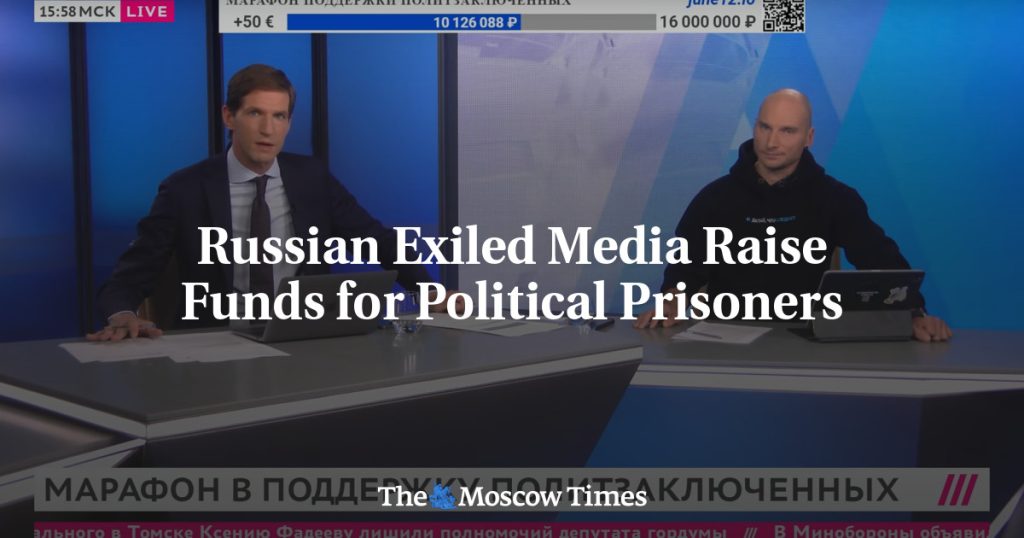A telethon organized by Russian exiled media and activists raised tens of thousands of euros in support of the increasing number of political prisoners in Russia. The crackdown on domestic dissent by the Russian government has intensified since the full-scale invasion of Ukraine in February 2022. The prominent rights group Memorial reports that Russia now has 739 political prisoners. Concerns for their safety have heightened following the death of opposition leader Alexei Navalny in prison in February. Major independent media outlets and rights groups participated in the telethon, which aimed to raise funds for political prisoners and their families.
Lawyers, activists, and cultural figures who oppose the invasion of Ukraine were invited to speak during the telethon. Notable attendees included political scientist Yekaterina Shulman, blogger Maxim Katz, and Alexei Navalny’s brother. Oleg Navalny emphasized the need for ongoing support for prisoners and their families, as they face significant expenses for family visits, lawyer fees, and fines. Vladimir Kara-Murza, a dual Russian and U.K. citizen serving 25 years in Siberia for criticizing the Ukraine invasion and the Kremlin, is of particular concern. One of his lawyers, Vadim Prokhorov, also in exile, noted that Kara-Murza’s health has been compromised due to previous poisoning attempts and his current detention conditions in a Siberian prison, where he has been in solitary confinement since September.
The increasing number of political prisoners in Russia reflects the government’s crackdown on dissenting voices following the invasion of Ukraine. Human rights organizations and independent media outlets have voiced concerns over the safety of these prisoners, especially following the death of Alexei Navalny in prison. The telethon organized by exiled activists and media aimed to raise awareness and support for political prisoners and their families, who face significant financial burdens. By bringing together various speakers who oppose the invasion of Ukraine, the event highlighted the importance of solidarity and advocacy for those imprisoned for their beliefs.
The ongoing crackdown on domestic dissent in Russia has led to a significant increase in the number of political prisoners, with 739 reported by leading rights group Memorial. Concerns for the safety of these prisoners have grown, particularly after the death of opposition leader Alexei Navalny in prison. The telethon organized by Russian exiled media and activists sought to raise funds for political prisoners and their families, emphasizing the need for ongoing support. The event featured speakers such as political scientist Yekaterina Shulman, blogger Maxim Katz, and Alexei Navalny’s brother, who highlighted the financial challenges faced by prisoners and the importance of standing in solidarity with them.
Vladimir Kara-Murza, a dual Russian and U.K. citizen serving a 25-year sentence in Siberia for criticizing the Ukraine invasion and the Kremlin, is among those of particular concern. His lawyer, Vadim Prokhorov, revealed that Kara-Murza’s health had been affected by previous poisoning attempts and his current detention conditions, which include solitary confinement in a Siberian prison. The situation faced by Kara-Murza underscores the dangers that political prisoners in Russia are exposed to, as they face not only legal challenges but also threats to their health and well-being. The telethon shed light on the plight of these prisoners and the need for continued advocacy and support to ensure their rights are upheld.
The repression of dissenting voices in Russia has intensified in the wake of the invasion of Ukraine, resulting in a significant number of political prisoners. Human rights organizations and independent media outlets have raised concerns about the safety and well-being of these prisoners, especially following the death of Alexei Navalny in prison. The telethon held by exiled activists and media aimed to provide support for political prisoners and their families, who face financial hardships due to legal fees, fines, and the costs of family visits. By bringing together various speakers who oppose the invasion of Ukraine, the event underscored the importance of solidarity and advocacy in challenging the government’s crackdown on dissent.


